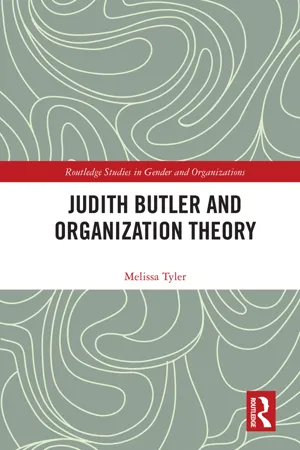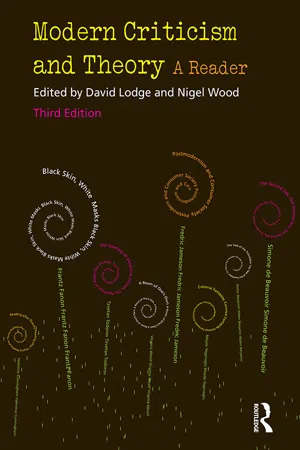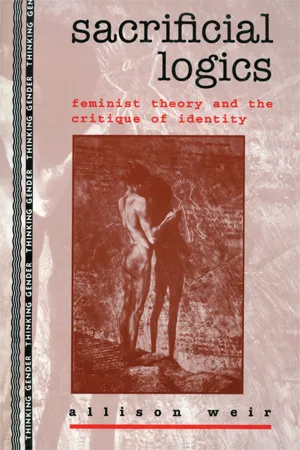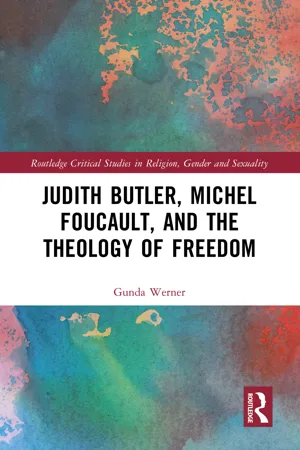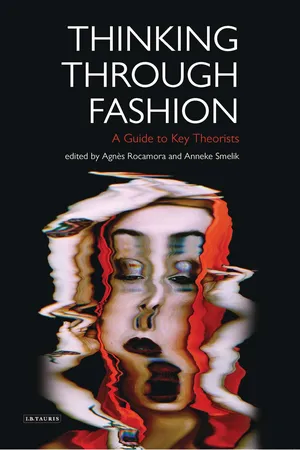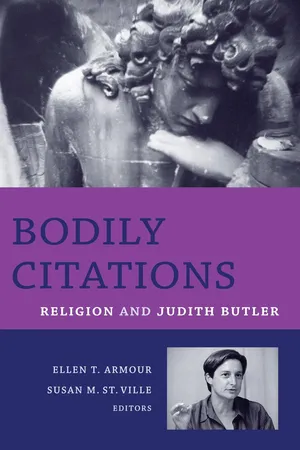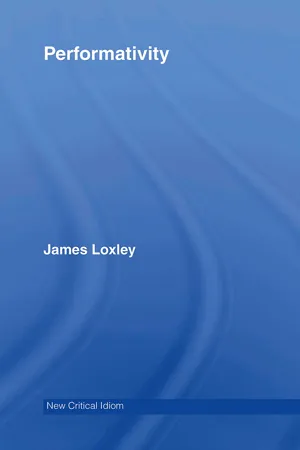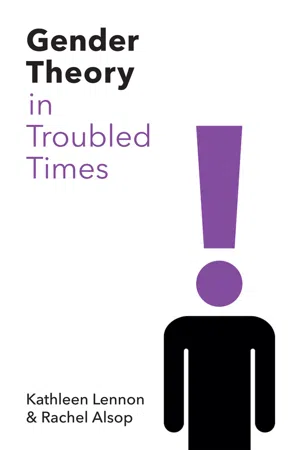Politics & International Relations
Judith Butler
Judith Butler is a prominent philosopher and gender theorist known for her work on gender performativity and queer theory. She has made significant contributions to the understanding of gender as a social construct and has influenced feminist and LGBTQ+ movements. Butler's ideas have had a profound impact on the fields of gender studies, philosophy, and cultural theory.
Written by Perlego with AI-assistance
Related key terms
Related key terms
1 of 4
Related key terms
1 of 3
10 Key excerpts on "Judith Butler"
- Robert McMurray, Alison Pullen(Authors)
- 2020(Publication Date)
- Routledge(Publisher)
6 Judith Butler Theorist and political activist Nancy HardingJudith Butler, a hugely influential but also controversial theorist, is a philosopher whose writings are not often found on the bookshelves labelled ‘philosophy’. Her job title is ‘Professor of Comparative Literature’, but her work on literature is a very small part of her oeuvre. An avowed feminist, her early, major books Gender Trouble and Bodies that Matter are seminal within queer theory.1 What is in no doubt is that she is one of the most important theorists in feminist and gender studies and her influence extends across disciplines, contributing not only to feminist, gender or queer accounts in those disciplines, but to new ways of thinking through and theorizing some major issues for academia in the 21st century. These include, for example, what form of left-wing politics might emerge to combat the rise of far-right extremism; who can and cannot be classed as ‘human’ and therefore disposable or protected; and whose lives are made precarious by the actions of governments?Butler’s work has provoked significant interest in management and organization studies, both through its influence on feminist or gender theories of work but also because her thesis of performativity (whose meaning will be unfolded in the next section) offers ways of understanding management, organizations and work more generally. Sometimes inadequate attention has been paid to the nuances of this influential theory, perhaps not surprisingly because her earlier works in particular are very difficult to absorb even after several readings. It could be tempting, after struggling with her early work, to ignore her later publications. This would be wrong because her account of performativity has developed. This chapter tracks those changes, showing how an increasingly sophisticated but more accessible account of performativity has evolved in her writing. Butler’s more recent work focused on developing a new radical politics through a feminist ethics of precarity and relationality and continues to build on her account of performativity. This chapter barely touches the surface of Butler’s influence in management and organization studies to date due to space constraints; rather it will look to the future and how, through tracking Butler’s evolving thought, possibilities for a new politics of working lives may be developed.- eBook - ePub
- Melissa Tyler(Author)
- 2019(Publication Date)
- Routledge(Publisher)
IntroductionJudith Butler is perhaps the most widely cited contemporary feminist philosopher. Although her work emanates from the United States, she holds a number of international academic posts; her writing has global resonance and has been translated into at least twenty languages. It draws from and speaks to a range of empirical ‘problems’, philosophical and political, contemporary and historical, and engages a complex and rich variety of theoretical traditions. A recent article in the New York Times magazine cited her performative theory of gender as recognizable to an audience well beyond academia, albeit in a popularized form (Fischer, 2016).1 As Vicki Kirby (2006) has noted, Butler’s writing is a valuable illustration of how to read critically and generously, unfettered by disciplinary boundaries whilst at the same time being painstakingly respectful of intellectual traditions and dialogues. The latter has often led to criticisms of Butler’s work as being overly and unnecessarily complex,2 yet it is a significant scholarly template, one that connects academic and activist concerns, and which shows what is possible when we write and think about mutual recognition3 - Stewart Clegg, Miguel Pina e Cunha, Stewart Clegg, Miguel Pina e Cunha(Authors)
- 2019(Publication Date)
- Routledge(Publisher)
13 Judith Butler and performativity Kate KennyChapter objectives
This chapter discusses:- How Butler’s early work examining discourses of gender and sexuality gave rise to her theories of identification and subjection
- Butler’s practical relevance as an influential thinker and a social activist
- Affective recognition and its location relative to other post-structural and psychoanalytic thinking, including that of Foucault and Lacan
- An overview of this approach including its relevance for debates about the relation between self and other, and agency and structure, within organization studies
- The concept of performativity and its implications for studies of networks of power and discourse
- The effects of subjection, including dynamics of exclusion and violence
Introduction
Unwilled proximity and unchosen cohabitation are preconditions of our political existence (Judith Butler, Notes Towards a Performative Theory of Assembly ).I felt overwhelmed with pride and gratitude that someone with the integrity to be so out as a lesbian was taking the leadership that the rest of us needed, not just emotionally but practically. It had been a long time since I felt real leadership before me that I could rely on. I experienced a great feeling of relief to see and hear that other voice, that other face literally creating a context one day, for me, whereas the day before there was none (Sarah Schulman [artist-activist and Distinguished Professor of English at the City University of New York]).Judith Butler holds the Hannah Arendt Chair at the European Graduate School and is the Maxine Elliot Professor in the Department of Comparative Literature and the Program of Critical Theory at the University of California, Berkeley. She is a philosopher and one of the most challenging thinkers of our time. The rich and nuanced theory of identification and subjection she develops encompasses an understanding of the productive, positive side of these processes along with their darker, more hurtful aspects. At the same time her account emphasizes the inescapable unpredictability of the ways in which we identify with dominant aspects of our social world, including our organizations.- eBook - ePub
Modern Criticism and Theory
A Reader
- Nigel Wood, David Lodge(Authors)
- 2014(Publication Date)
- Routledge(Publisher)
38 Judith Butler DOI: 10.4324/9781315835488-38 Introductory note Judith Butler (1956–) is the Maxine Elliot Professor in the Departments of Rhetoric and Comparative Literature at the University of California, at Berkeley. Her work on representations of gender has altered the contemporary debate about the role of sexual behaviour in contemporary life, and has created links between social history, psychology and the semantics of desire. She first came to international notice with her first full-length study, Gender Trouble: feminism and the subversion of identity (1990), wherein she questioned the essential characteristics of gender difference and the biological imperatives that cause us to act in a gendered way. The ‘Trouble’ of the title is that impulse to question and deny received opinions and judgements, running the risk of short-term opposition or isolation, but in the long term actually laying claim to a truer context for discussion and social development. Male or Female identities are the sum of certain repetitive stylized acts; far from these deriving directly from alternative biological constitutions, they appear to be instinctual because of the pervasive mediation of what Michel Foucault called ‘regulative discourses’ (see his Surveiller et Punir: naissance de la prison [1975; trans. as Discipline and Punish; the birth of the prison [1977]), at times legal, but more usually social in origin. Even anatomical differences enter the world of discourse as soon as they are represented in the media, and certain taboos or desires are constructed around them. Daily life is increasingly based on the creation of consumer desire, and our bodies are clothed and even altered in line with these expectations - eBook - ePub
Sacrificial Logics
Feminist Theory and the Critique of Identity
- Allison Weir(Author)
- 2014(Publication Date)
- Routledge(Publisher)
5 From the Subversion of Identity to the Subversion of Solidarity? Judith Butler and the Critique of Women s Identity Judith Butler avoids Luce Irigaray’s paradox—the affirmation of a women’s identity in the face of a repudiation of identity as a phallogocentric construct—by sticking to a much more consistent deconstruction of identity. For Butler, the subversion of identity must be extended to a subversion of any notion of a women’s identity. Butler’s critique of gender identity and her theory of gender as performance lead in important directions, but her acceptance of the claim that identity is always a product of a sacrificial logic leads her into new paradoxes. In her book Gender Trouble: Feminism and the Subversion of Identity, Judith Butler offers a compelling political and philosophical analysis of the ways in which fixed gender identities serve to constrain the constitution of subjectivity. To do this, she draws a number of different arguments together. Central to her analysis is the psychoanalytic argument, developed with some ambivalence by Freud and made explicit by Lacan, that gender differences and heterosexual orientation are not simply natural but are rather products of a fixed socio-symbolic order which is fundamentally patriarchal. The psychoanalytic argument is supplemented and criticized by Foucault’s argument that gender identities must be understood as the effects of multiple discourses, practices, and institutions, rather than as expressions of a single repressive symbolic order - Gunda Werner(Author)
- 2023(Publication Date)
- Routledge(Publisher)
3Becoming human in freedom Becoming a subject according to Judith ButlerDOI: 10.4324/9781003435389-4Unlike critique, Judith Butler does not see their concept of subject theory as a departure from the subject1 : instead, they put it in the context of the basic critical deliberation of the subject of modernity.2 They question “identity politics” in particular, even if these are the foundation of both feminism and other resistance movements.3 They question the identity of being a ‘woman’ just as much as the thought of a woman as a subject or of gender.4 “Identity categories are never merely descriptive, but always normative, and as such exclusionary.”5 Butler is, therefore, convinced6 that deconstructing the feminist subject opens the horizon for getting away from radical, and even racist, ontologies through the diversity of meanings.7 The socio-critical viewpoint is included in the awareness of the subject's incompleteness. Butler is also convinced that the critical or deconstructing view of subjects makes them critical of norms, instead of incapacitating them entirely. At the same time, it remains a dangerous critique8 with which the subject puts itself at stake. Perhaps the awareness confronting subject theoreticians today, that the incompleteness of the subject goes hand in hand with the incompleteness of their theory, comes closest to the situation serving as a backdrop to the debate about subject definitions. The following detailed interpretation of Butler's philosophy as subject philosophy is undertaken in concert with the aim of distilling the lessons to be learnt from Judith Butler about how power works.Judith Butler and the theory of subjectivation – Principles of subject philosophy
It is precisely because the work of Judith Butler, beyond their focus on gender, was only recently reviewed by German theology that makes the theological discussion of their power-analytical research worthwhile. The events of September 11, 20019 have shifted their view of the gender debate increasingly towards the anthropological meaning of war and terror, thereby changing their hermeneutic perspective.10- eBook - ePub
Thinking Through Fashion
A Guide to Key Theorists
- Agnès Rocamora, Anneke Smelik, Agnès Rocamora, Anneke Smelik(Authors)
- 2015(Publication Date)
- I.B. Tauris(Publisher)
17 Judith Butler Fashion and PerformativityElizabeth WissingerIntroduction
Something radical happened to fashion studies in the 1990s: as post-modern and post-structural disruptions ripped through many academic fields, fashion studies experienced a new kind of energy. Feminism, formerly rejecting fashion as a patriarchal conceit, started looking at it with fresh eyes, amidst the rumblings of third wave feminist ideas that gave birth to riot grrrrl culture and a re-appropriation of the joys of lipstick and lingerie, re-cast as feminine practices to be wielded at the wearer’s will. As HIV/AIDS forced a formerly closeted culture to fight for life, and in so doing, raised mainstream awareness of gay culture, transgender became more visible, as well. This new awareness trickled through celebrity turns from David Bowie, Grace Jones and Michael Jackson’s sleek evocations of playful androgyny, to Boy George’s eyeliner and Madonna’s gender-bending. As the rise of biotechnology burst through formerly sacrosanct divisions between the living and inert, elevating the cyborg as a new cultural ideal, Judith Butler’s work emerged amidst disintegrating binaries of all sorts.Fashion’s continuous interrogation of existing boundaries in search of the new, combined with its history of androgyny and gender play, lent itself well to the nascent movement of queer studies, for which Butler’s work eventually became central. By arguing for more than just the categories ‘male’ and ‘female’ to describe the human experience, queer studies ventured into a new kind of academic analysis of sexuality aimed at challenging the heteronormative order by critiquing forms of power that marginalized anything but heterosexual practices. Judith Butler’s feminist analysis of gender dovetailed well with these concerns, and conferred a new status on the study of style, asking, as it did, deeply philosophical questions about the body and how it is stylized into existence within predominant structures of culture and power, not the least of which is fashion. - eBook - ePub
Bodily Citations
Religion and Judith Butler
- Ellen Armour, Susan St. Ville(Authors)
- 2006(Publication Date)
- Columbia University Press(Publisher)
In addition to continuing her academic work, Butler has taken on an increasingly visible role as a public intellectual; she has authored several essays in venues such as the Nation and the New York Times. A recent book, Precarious Life, is a collection of essays using theoretical insights gleaned over the years to critically evaluate political attitudes and actions since the events of September 11, 2001. Undoing Gender (2004) finds Butler returning to gender, sex, and politics via questions of life and death, violence and violation, this time with greater attention to the variety of sexual identifications (transsexual, intersexed, transgendered) that populate that terrain. 13 Why Should Religionists Care? From the account we have given of the paths Butler’s work has taken, readers should be able to see the grounds for a possible alliance between that work and the various strands of scholarship on religion that involve analysis of gender, sex, and sexuality. Philosopher Alan Schrift has argued recently for the importance of Butler’s work on subjectivity not just for feminist and queer theories but for philosophy as a whole. 14 We would make the same argument on behalf of religious studies, and thus we hope the essays appearing here will prompt many of you to explore Butler’s work on your own. Her ongoing investigations into the relationships between bodies, language, and cultural norms in identity construction should interest religionists, given the role of bodily practices (including linguistic ones) in the production of religious identities. Her exposure of the lingering and deleterious effects of models of divine sovereignty in our current political context should also speak to scholars of Western religious traditions - eBook - ePub
- James Loxley(Author)
- 2006(Publication Date)
- Routledge(Publisher)
Even as the implications and consequences of the deconstructive reworking of speech act theory were still being registered and debated in the academy, a number of theorists more clearly focused on specific political projects were beginning to see in the concept of the performative a resource relevant to their own purposes. In particular, ‘queer theory’ began to emerge from the conjoining of a feminist theory and politics of gender, which had always been productively plural in both its analyses and its activist demands, and burgeoning academic and political concern with the comprehension and representation of sexuality. Questions around sexuality had long been a crucial topic for feminist thinking, and queer theory was concerned in part to rearticulate the relations between the identity categories of sex, gender and sexuality. In the work of Eve Kosofsky Sedgwick, for example, such categories were not assumed as stable reference points for thinking about identity. The history of the category ‘homosexual’, a history that could both confirm and confound the standard heterosexist association between gender and sexual orientation, was an important resource for this kind of questioning since it could show how such categories were produced while also revealing their potential instability. In an article on Henry James, she focused on what she called ‘queer performativity’, ‘a strategy for the production of meaning and being’ (Sedgwick 2003:61) that reflected critically upon dominant assumptions regarding both identity and the powers of language.This kind of reflection has found its most sustained expression, though, in the work of the American philosopher Judith Butler. In Gender Trouble , Bodies that Matter and Excitable Speech , in particular, she has presented a challenge to feminist theory and politics that puts the concept of the performative centre stage. To say that her recasting of performativity has been influential would be to understate the case by several orders of magnitude: it has generated voluminous commentary and protracted debate, and had a huge impact on the theory and politics of identity in general as well as on an extensive range of academic disciplines. And while the implications and range of her work reach beyond this recasting, as her more recent publications have demonstrated, it remains among the most commonly remarked features of that work.RETHINKING THE BODY, CHALLENGING IDENTITY: THE DEMANDS OF POLITICS
It was a sense of the pressing requirements of feminist political activism, rather than mere intellectual curiosity, that led Butler to the concept of performativity as a theoretical resource. As she herself put it in Gender Trouble :Categories of true sex, discrete gender, and specific sexuality have constituted the stable point of reference for a great deal of feminist theory and politics. These constructs of identity serve as the points of epistemic departure from which theory emerges and politics itself is shaped. In the case of feminism, politics is ostensibly shaped to express the interests, the perspectives, of ‘women’. But is there a political shape to ‘women’, as it were, that precedes and prefigures the political elaboration of their interests and epistemic point of view? How is that identity shaped, and is it a political shaping that takes the very morphology and boundary of the sexed body as the ground, surface or site of cultural inscription? What circumscribes that site as ‘the female body’? Is ‘the body’ or ‘the sexed body’ the firm foundation on which gender and systems of compulsory sexuality operate? Or is ‘the body’ itself shaped by political forces with strategic interests in keeping that body bounded and constituted by the markers of sex? - eBook - ePub
- Kathleen Lennon, Rachel Alsop(Authors)
- 2020(Publication Date)
- Polity(Publisher)
6 Judith Butler: Performativity, Precariousness and QueeringGender is the repeated stylization of the body, a set of repeated acts within a highly regulatory framework that congeal over time to produce the appearance of a substance. (Butler 1990a: 33)From the 1990s onwards, the work of Judith Butler has come to occupy a central position in gender theory. In her performative theory of gender, she draws attention to the way mundane and everyday practices, both linguistic and other, are productive of the meaning of what it is to be a man or a woman and thereby productive of gendered selves. The nature and importance of such performativity became widely discussed with the publication of Gender Trouble in 1990 and has since been employed to explore not only the categories of gender but other dimensions of social difference (Tate 2005; Garland-Thomson 1997; Ahmed 2006). Butler herself has continued to develop her exploration of the emergence of subjectivity, the sedimentation of social categories and the possibilities for disrupting oppressive social norms (1993, 1997a, 1997b, 2004b, 2015). She increasingly does so in a context in which she stresses the precariousness of our existence. Such a notion highlights our vulnerability to the gaze of particular and generalized others and the public practices of naming on which we are dependent for the emergence of our own subjectivity and sense of self. Without such recognition from others we become unintelligible to them and to ourselves. Nonetheless, such identifications, and the categories in terms of which they are made, are inherently unstable, themselves precarious. It is impossible to inhabit fully the categories with which we are addressed, so our subjectivity is always incomplete, always in process. Moreover, the different practices of naming to which we are subjected, as people who are gendered, raced, classed, aged and carrying marks of our sexualities or abilities, and so on, mean that each category is ‘translated’ in terms of the other in just the ways discussed in the previous chapter. Given that many of the practices of social naming have oppressive consequences and render as socially unintelligible those lives which cannot easily be contained within their legitimating norms, Butler’s goal in Gender Trouble
Index pages curate the most relevant extracts from our library of academic textbooks. They’ve been created using an in-house natural language model (NLM), each adding context and meaning to key research topics.
Explore more topic indexes
Explore more topic indexes
1 of 6
Explore more topic indexes
1 of 4

